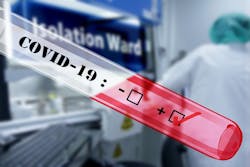Updated isolation guidance does not imply immunity to COVID-19
On August 3, the Centers for Disease Control and Prevention (CDC) updated its isolation guidance based on the latest science about COVID-19, showing that people can continue to test positive for up to three months after diagnosis and not be infectious to others. Contrary to current media reporting, this science does not imply a person is immune to reinfection with SARS-CoV-2, the virus that causes COVID-19, in the three months following infection. The latest data simply suggests that retesting someone in the three months following initial infection is not necessary unless that person is exhibiting the symptoms of COVID-19 and the symptoms cannot be associated with another illness, according to the CDC.
People with COVID-19 should be isolated for at least 10 days after symptom onset and until 24 hours after their fever subsides without the use of fever-reducing medications.
There have been more than 15 international and U.S.-based studies published looking at length of infection, duration of viral shed, asymptomatic spread and risk of spread among various patient groups. Researchers have found that the amount of live virus in the nose and throat drops significantly soon after COVID-19 symptoms develop. Additionally, the duration of infectiousness in most people with COVID-19 is no longer than 10 days after symptoms begin, and no longer than 20 days in people with severe illness or those who are severely immunocompromised.
The CDC will continue to closely monitor the evolving science for information that would warrant reconsideration of these recommendations.

